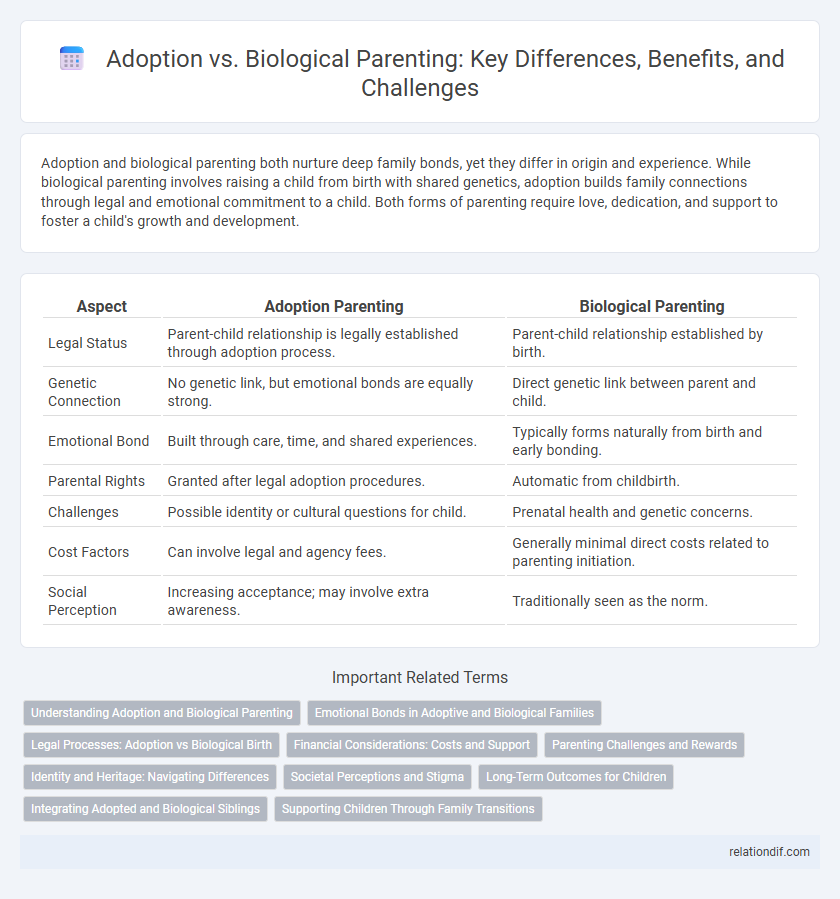Adoption and biological parenting both nurture deep family bonds, yet they differ in origin and experience. While biological parenting involves raising a child from birth with shared genetics, adoption builds family connections through legal and emotional commitment to a child. Both forms of parenting require love, dedication, and support to foster a child's growth and development.
Table of Comparison
| Aspect | Adoption Parenting | Biological Parenting |
|---|---|---|
| Legal Status | Parent-child relationship is legally established through adoption process. | Parent-child relationship established by birth. |
| Genetic Connection | No genetic link, but emotional bonds are equally strong. | Direct genetic link between parent and child. |
| Emotional Bond | Built through care, time, and shared experiences. | Typically forms naturally from birth and early bonding. |
| Parental Rights | Granted after legal adoption procedures. | Automatic from childbirth. |
| Challenges | Possible identity or cultural questions for child. | Prenatal health and genetic concerns. |
| Cost Factors | Can involve legal and agency fees. | Generally minimal direct costs related to parenting initiation. |
| Social Perception | Increasing acceptance; may involve extra awareness. | Traditionally seen as the norm. |
Understanding Adoption and Biological Parenting
Adoption creates permanent legal and emotional bonds between parents and children, often involving a rigorous selection and matching process while biological parenting begins with genetic connections and pregnancy. Both adoption and biological parenting require commitment, nurturing, and attachment to foster healthy child development. Understanding the unique challenges and strengths of each approach promotes empathy and supports diverse family structures.
Emotional Bonds in Adoptive and Biological Families
Emotional bonds in adoptive families often develop through shared experiences, trust, and consistent caregiving, proving that attachment is rooted in emotional nurturing rather than genetics. Biological parenting can offer innate connections, but emotional closeness depends significantly on the quality of interaction and responsiveness to a child's needs. Studies show that secure attachments in both adoptive and biological families contribute equally to a child's emotional well-being and social development.
Legal Processes: Adoption vs Biological Birth
Adoption involves a formal legal process requiring consent from birth parents or termination of their rights, court approvals, and the finalization of adoption orders to establish parental rights for adoptive parents. In contrast, biological parenting automatically confers legal parental status at birth, documented through a birth certificate without additional legal procedures. Legal complexities in adoption include background checks, home studies, and post-placement supervision to ensure child welfare, whereas biological parenting entails no such court interventions.
Financial Considerations: Costs and Support
Adoption often involves significant upfront costs including legal fees, home studies, and agency charges, whereas biological parenting typically incurs prenatal and delivery expenses alongside ongoing child-rearing costs. Financial support for adoptive families may include subsidies, tax credits, and adoption assistance programs that help offset expenses not commonly available to biological parents. Long-term financial planning for both adoptive and biological parents should consider education, healthcare, and potential special needs resources to ensure sustainable child support.
Parenting Challenges and Rewards
Adoption presents unique parenting challenges such as navigating identity development and addressing potential attachment issues, while biological parenting often involves managing genetic health concerns and inherent behavioral traits. Both forms of parenting offer profound rewards, including the deep emotional bonds formed and the fulfillment of nurturing a child's growth and development. Understanding these distinct dynamics aids in fostering resilient, loving family environments regardless of biological ties.
Identity and Heritage: Navigating Differences
Adoption and biological parenting both shape a child's identity, with biological parenting often providing a direct genetic link to heritage and culture. Adoptive parents play a crucial role in fostering a sense of belonging by intentionally preserving and sharing the child's cultural background and family history. Understanding the nuances between genetic heritage and experiential identity helps families navigate complex emotional and social dynamics.
Societal Perceptions and Stigma
Societal perceptions of adoption often carry stigmas rooted in misconceptions about family legitimacy and genetic ties, leading to biases against adoptive parents and children. Biological parenting is frequently idealized due to perceived natural bonds and hereditary connections, which can marginalize adoptive families within communities. Awareness campaigns and inclusive policies are crucial to challenging these stigmas and promoting acceptance of diverse family structures.
Long-Term Outcomes for Children
Research consistently shows that adopted children often experience positive long-term outcomes comparable to those of biological children, especially when placed in supportive, stable families. Emotional well-being, academic achievement, and social development in adoptees improve significantly with quality parenting and early interventions. Studies highlight that the quality of the parent-child relationship is a stronger predictor of success than biological ties.
Integrating Adopted and Biological Siblings
Integrating adopted and biological siblings enhances family unity by fostering mutual respect and shared experiences. Establishing open communication and creating inclusive family traditions help bridge potential emotional gaps, promoting a sense of belonging for all children. Encouraging cooperation and empathy cultivates strong sibling bonds, essential for long-term harmony in blended families.
Supporting Children Through Family Transitions
Supporting children through family transitions requires understanding the unique emotional and psychological needs that arise in both adoption and biological parenting. Consistent communication, stability, and open discussions about identity and belonging significantly aid in fostering resilience and trust. Tailored support systems involving counselors, support groups, and educational resources enhance the child's adjustment and promote healthy family dynamics.
Adoption vs Biological parenting Infographic

 relationdif.com
relationdif.com